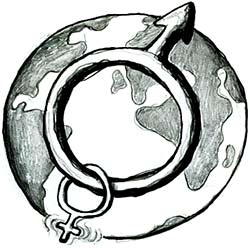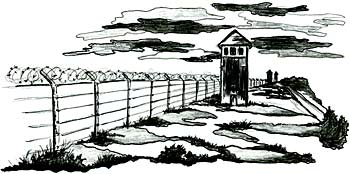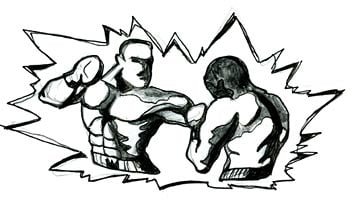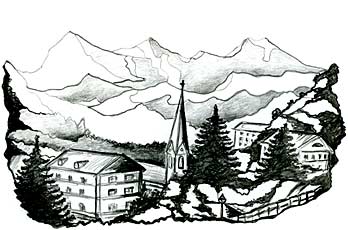Elfriede Jelinek
Article

Elfriede Jelinek: Provocation as the Breath of Life
by Sture Packalén*
This article was published on 16 June 2005.
Elfriede Jelinek has, for more than twenty years, constantly challenged her contemporaries with texts which are feminist and deeply critical of society and, moreover, which are perceived to be obscene, irritating and full of biting derision. With her satirical acumen, a love of linguistic experiment and not least by treading upon and, indeed, overstepping taboos in the sexual sphere, she has succeeded in provoking strong reactions. No Austrian author has excited as much hatred as Elfriede Jelinek, but nor has any other received such a euphoric reception.
With her fellow-countrymen Karl Kraus and Thomas Bernhard as satirical and polemical models, Jelinek is a peculiarly inconvenient and sharp critic of Austrian society and its Catholic and authoritarian background. Jelinek perceives herself as a combatant feminist with clear left-wing sympathies. Remorselessly, she exposes the hypocracies, the façades and the hollowness of social conventions, rituals and patriarchal traditions which lead to the oppression of women and the abuse of power. According to Jelinek herself, everything she writes is “a paradigm of the division of power in society”. Her task is to show how economics, sexuality, discrimination and racism are all intertwined with each other.
One can view Jelinek’s singular authorship as a triangle, the surface of which is covered by an unstable fermenting language and whose corners point in three different directions: towards a feminist perspective, a Nazi past and the contemporary political arena. In each angle of the triangle Jelinek embodies permanent protest and controversial attitudes. She is a disturber of the peace, an outsider who appears to be on the periphery but who, in fact, in that position is able to discern established, but often invisible patterns of thought which are central to our time.
At the Centre of the Female Inferno
One such pattern is that life and the world is most often viewed from a male perspective. Against this male view of the world Jelinek posits her own singular outlook. In her books and plays, this view appears highly divergent from the normative male patterns of thought about how one should experience, think and act as a human being. In her early texts, for example, the collage-like pop novel “we’re decoys, baby!” (wir sind lockvögel baby!, 1970), the novel Women as Lovers (1994; Die Liebhaberinnen, 1975) and the Ibsen-inspired audio play “What Happened After Nora Left Her Husband or Pillars of Society” (Was geschah, nachdem Nora ihren Mann verlassen hatte oder Stützen der Gesellschaft, 1980), Jelinek depicts those with whom she empathises the most in society: women without prospects, who are economically dependent and on the lowest rungs of the social ladder. These ordinary women find themselves literally in the shadow of their men and see themselves through men’s eyes. Only rarely do they dare to express their own wishes, their opinions or desires. They give birth to children, cook, dress themselves and live, as it were, in a glass show-case of femininity without the capacity to engage in transforming contact with the outside world. Any desire for education fades in the face of the social pressure to get married:
in paula’s head there appears a little bud, might not dressmaking after all have been better than erich. the bud is immediately torn out and trampled underfoot.
Women as Lovers, translated by Martin Chalmers
These oppressed women suffer both from the physical violence to which they are exposed with their men and from the submissiveness which they impose upon themselves in their women’s role. But none of the women in Jelinek’s novels and plays are to be regarded as purely passive figures, as objects of men’s lust and oppression. All are in fact active agents. Yet, they have been broken from within in that they have both accepted their submission and at the same time tried to tear off the mask of womanliness which has been forced upon them. A Woman’s life is an inferno and Jelinek pierces to its core.

For the most part Jelinek depicts her fictional female figures in a private, domestic setting, but that doesn’t mean that she sees in domestic life the possibility of any radical change in society or in the position of women. On the contrary it is in the private sphere that the stunting of thought and feeling takes place since women have accepted patriarchy. Mothers are depicted as subjugated beings in their own kingdom. And women who have been oppressed, in their turn, oppress their own children. Even if a mother perceives herself as an “angry” martyr, in Jelinek’s work she is the one who, unreflectingly, carries out the oppression which is institutionalised in the dominant male-ordered social structure:
The head of a four-year-old is thrown back by a mother’s slap of hurricane strength. For a moment, the head rotates helplessly, lika roly-poly that has lost its balance and is having a hard time getting back on its feet. Eventually the child’s head is vertical again and back in its proper place. But now it emits horrible sounds, whereupon the impatient mother promptly knocks it out of plumb again. Now the child’s head is marked by invisible ink and ordained for a much worse fate. The mother has heavy bags to struggle with, and she’d much rather see her little girl vanish down a sewer. You see, in order to mistreat her daughter, she has to keep putting down her bags, which only adds to her drudgery. Yet the extra effort seems worthwhile. The child is learning the language of violence, though not willingly. At school, she likewise picks up very little. She knows a few words, the most necessary ones, even though you can barely understand them among her sobs and tears.
The Piano Teacher, translated by Joachim Neugroschel
The Mute Kingdom of the Body
With cruel consistency Jelinek exposes the abuse of power through the infernal mother-daughter relationship in the above quoted, controversial novel The Piano Teacher (1988; Die Klavierspielerin, 1983; filmed as The Pianist, directed by Michael Haneke). In this novel, the protagonist Erika Kohut lives with her mother but is cut off both from her inner self, from her own body and from other women’s lives. It is a nightmare existence reminiscent of a prison where there is piano-playing on the timetable and where the mother, like a prison guard, constantly spies on and controls the movements of the prisoner. Erika Kohut is in no way a role-model, bound as she is to a demanding, elderly mother. Nor does the novel, in its depiction of the female abyss of everyday life, give any guidelines as to what a woman’s existence could be like. This, however, is what Jelinek wants to do: she wants to provoke into existence new thinking about an alternative female identity and sexuality, where feelings need neither be a trading commodity nor be transmuted into piano-playing, anorexia or muteness.
Even more scandalised attention was aroused by Jelinek’s novel Lust (1992; Lust, 1989), which in the eyes of the custodians of morality is full of obscenities. But the book is, above all, a general attack on the Austrian idyll and a darkly satirical critique of society. Jelinek shows that in this society, man controls not only the violence but also the crudely humiliating, sexualised language. The woman’s world on the other hand is kept silent, and her joie de vivre seldom finds room for expression:
She can hear her feelings rumbling closer like thunder. Racing like an express through the station of her body. Even the station-master’s signal baton is almost too much for her. She is obeying her own command. And no one else’s. The powerful current that charges these creatures of feeling shocks them like divine intervention.
Lust, translated by Michael Hulse
A woman owns nothing more than “the mute kingdom of her body”. In opposition to the physical muteness in her texts, Jelinek allows a female subconscious to make itself heard. This subconscious not only denies what seems obvious in the traditional view of women, but also in describing female sexuality and feeling, questions man’s demand for power and female submission. With her feminist consciousness of the meaning of subtext, that is to say, of the real meaning behind the words, Jelinek aims in her own way to create a linguistic space of their own for women and to cause them to reflect on the power structure of society.
The Nazi Past
The power structure of society is reflected most clearly in Jelinek through sexuality, but it is also seen in her attacks on the language of advertizing and the media and, most of all, in her criticism of political clichés and empty phrase-making. She reveals ways of thinking which are characteristic of those who would deny the Nazi past, and who have a particular view of the present political world order, both national and international. Just as in her feminism Jelinek is a merciless observer and depicter of power and powerlessness, so also does she let the searchlight of her mind and pen sweep over the memory of the Nazi past and over the political landscape of present-day Austria. Inexorably she pauses and shines a light into the darkest corners. That those who are caught in its beams should savagely try to ward off the light is not hard to understand.
The silence and physical muteness that Jelinek sees in women and on which she comments in her sub-text corresponds on an external, social level to the silence about and denial of memories and events in the brown-shirted past. Even here Jelinek chooses to be the inconvenient voice that clothes the unconscious in words. One could say that she takes up Freud’s ideas about das Unheimliche, “the uncanny”, that is to say that which according to Freud is “secret and should have remained concealed, but which anyway comes into the open” out of the unconscious. This unconscious Unheimliche, which pops up out of the cellar of suppression, is situated in an ambivalent and disturbing interspace of the psyche. It is precisely this “interspace” to which Jelinek gives a voice in her texts when she, from her outsider position in Austrian culture, writes about those things which are suppressed in her native land. In an unabashed manner she shows that the undesired and unfamiliar are in fact to be found right in the middle of the mental geographic map of Austria, although no one wishes to see it. As the bad conscience of Austria, Jelinek tells of that which has been falsified and suppressed. For example, in the novel Wonderful, Wonderful Times (1990; Die Ausgesperrten, 1980) she shows, in a brutally revealing manner, how juvenile violence in Austria in the ’50s and ’60s came out of the older generation’s unwillingness to come to terms with the past.
The past is a sluggish under-current in almost all that Jelinek writes, and this comes out most clearly in “The Children of the Dead” (Die Kinder der Toten, 1995) where she stirs up the noisome dregs of old Nazi crimes and of neo-Nazi ways of thinking. In a number of interviews she has described this six-hundred-page book as her most important work. The setting is a boarding-house up in the alps. However, the tourist idyll is a façade and, in fact, Jelinek depicts a camouflaged dead landscape where neither the past nor the future exists. In the book’s “present”, the victims of the Nazis – the so-called “undead”, those who will not die – speak to the living who are dead without knowing that they are. The novel is a “ghost story about Austrian identity”, an identity of disturbing emptiness which echoes with the voices of the dead. According to Jelinek, Auschwitz must always be present as a resonance in the literature, even if the concentration camps themselves no longer exist in reality. When she writes about the dead who haunt the present it is because their silenced history needs to be constantly reprocessed. It must not be lost in a mass of obligatory ceremonial speeches:
Whoever exterminated all these hecatombs of people, did not take into account, and perhaps had no way of knowing that, having passed through the fire they would gain a lasting power which would combine with the power of those still living. This power draws us, who are here addressing you by letter, out into a shrieking whirlwind where no memorial ceremonies with talking, singing, drinking and laughing presidents and chancellors will be able to find us.
 |
Political Mud-slinging and Everyday Racism
“The Children of the Dead” provoked strong reactions. Jelinek was defamed from all directions: the gutter press rhymed Jelinek with Dreck (dung) and the right-wing populist politician Jörg Haider, during his election campaign of 1995, had large posters put up bearing the text: “Do you want culture or Elfriede Jelinek?” The author’s eloquent answer to this was to forbid the staging of her plays by any of Austria’s state theatres. Only after the change of government in 2002 did she lift the ban from the theatres. That many people disliked her digging into the past is clear from the defaming of her, as early as 1985, as a “traitor” and “back-biter”, a “communist” and “pornographer”. It was then that she caused a major scandal with the “drama à clé” “The Burg Theatre” (Burgtheater, 1983). The play is a satire about the fact that many famous actors of this Viennese theatre institution – which during the Third Reich was a part of the national-socialist propaganda machine – in the post-war period could continue their careers with the Austrian national theatre. No one questioned either this or the lying language on which film, theatre and cultural life in Austria was unreflectingly based.
The legacy of the Nazi past and how it is visible in the present Jelinek also depicts in the play “Stick, Staff and Pole” (Stecken, Stab und Stangl, 1997), which takes up the murder by letter bomb of four Romanies in an Austrian village; murders which were treated with indifference by the press. In this play Jelinek characteristically widens the perspective to the Nazi extermination of Jews and Romanies. At the same time, she makes a connection with everyday racism with the enthusiasm for sport and sensational journalism. The thematic and linguistic multiplicity of this play continues in “A Sportsplay” (Ein Sportstück, 1998) where Jelinek, as a declared sport hater, draws parallels between nationalism, sport fanaticism and fascism. Sport is, for her, equivalent to contempt for artistic and intellectual achievement, a kind of war, and a mass phenomenon which sanctions violence and despises the weak. Fitness and the body culture are also a metaphor for all the exaggerated exertions which we humans in the rich part of the world devote ourselves to in order to keep ourselves strong and beautiful:
Legs break, sinews are torn, veins burst, ligaments are stretched too far, but manage somehow to survive. Human bodies engaged in sport are like pizza boxes or disposable mugs, at first they are beautiful and then they are second-hand: yes all used up! But at any rate they are washable and easy to take care of thanks to the modern fibres which the Creator has used to make them …

The Voices of the Dead
Once again Jelinek makes her own connections between the present and past in the play with the idyllic title “In The Alps” (In den Alpen, 2002). The accident in the mountain railway tunnel at Kaprun in the year 2000 in which 150 people died, and the great dam project in exactly the same place which was started by the Nazis, cause Jelinek to reflect on the complex relationship between culture, technology and nature. At a ghostly ski lift station, the living and the dead from different epochs are gathered, and they discuss man’s exploitation of the landscape and his hubris with regard to nature. Even here, it is a question of the “undead” spirits who, like modern goddesses of vengeance, bring to the light of day all kinds of painful experiences.
 |
We also come face to face with the undead in “Death and the Maiden I-V: Princess Plays” (Der Tod und das Mädchen I-V.: Prinzessinnendramen, 2002). With female role models such as Snow White, Sleeping Beauty, Jackie Kennedy and Marilyn Monroe, these plays of Jelinek are disarmingly self-ironizing, but at the same time mercilessly serious narratives about female worlds and self-images, about submission, power, life and death.
Jelinek constantly returns to the subject of death and her texts, as she herself says, often move at the point of intersection between Being and Nothingness. Just at that point, close to Nothingness and Death, she locates Austrian identity. In the Austria of hypocrisy, of shameful events swept under the carpet and of patriarchal oppression, Jelinek wants to ask questions about humanity, about our cynicism and egoism, about the reality behind the neat façades. But her authorship in reality knows no national borders: the nightmares are universal and are to be found wherever mankind is. We can see this in, for example, her theatre text on the Irak war, Bambiland (2004 ), where she makes a connection between the news reports of CNN and Aeschylus’s Greek war tragedy “The Persians”. The text, as Jelinek herself says, is “an amalgam of media reports on Irak”. She does not see the war from the viewpoint of the victims: she observes the observers, comments on the commentators and in this way makes her own ironic comments on the current political developments.
They fight. Well then. What else would they do. They fight. To those whose sons are with the army now, my words bring fearful thoughts. Never mind. Elsewhere, poverty drives the people to extremes, at least here they have a task and they keep off the streets, they’ve turned away from the fields where they would have been needed, they are a different street, but we’re already there. We’re there, and we send the pictures, and stick to them, we’re the stamps of our pictures whose only purpose is to be sent off home. Home. We are the ultimate. No one more skilful than us, that’s why we send the pictures. So that we are not sent ourselves. Into the sands. May the good fulfil itself, may we be victorious! We are the wall, us saying yes is the first mental activity. Where we say yes, the beginning finally starts. We shoot, we drink, and we send. Why on earth does he want to loot this city? We will tell him, and we will send him the pictures to go with it, so that he knows what we are telling him.
The War on Lies
What is upsetting about Jelinek’s texts is not just that she is able to agitate and provoke with the subjects she treats, but rather that she, as it were, dissolves the personalities she depicts. She shows sarcastically that they are nothing more than empty shells lacking content. They consist of nothing more than fragments out of newspapers, television, advertizements, political ideologies with perhaps a smattering of the history of ideas. Behind the fake cosiness of heimat films, the rancorous attacks of politicians, the treacherously reactionary everyday language, the men’s language of power, the polished phrases of the cultural elite and the tunnel vision of international media reporting, Jelinek often sees simply the reinforcement of prejudices, hardened attitudes and political bluff.
Jelinek has taken it upon herself, in her authorship, to point out all this falseness in order to make us ransack our underlying values. “I don’t do what I do willingly, but I have to do it,” she says. To employ language is for her a form of resistance to life and society. She wants to reveal what is concealed and has been concealed in the past. By means of the organised artistic shock that her writing in fact is, she tries to get rid of conventional boundaries and patterns of thought. This is what she is about when, like a linguistic juggler, she puts the unfamiliar into the habitual and everyday. Her aim is to cause a different and new standard of measurement to emerge, a new order which is only uncovered through violent conflict. Jelinek is never afraid of tackling this conflict in order to get her new perspective on the female and the male, on the past and the political course of events to appear. To be constantly in a state of dissolution, and to oppose the sleek, the standardised and supposedly unprejudiced – this is the breath of life to Jelinek.
Like Bertolt Brecht, she believes that literary works are only able to survive if they resist. When the language no longer puts up any resistance, when instead, as Jelinek says in her Nobel Lecture, it “shamelessly rolls around under the hands of the caressers”, then she begins to be afraid that the language has been disarmed and has lost its essential power. For fear of being dragged into the all too well-oiled ‘culture machine’ and thus betraying her true vocation as writer she battles against the temptation of the language to make itself “the slave of strangers’ hands, no matter how good it feels”. Even in the midst of her success in being awarded the Nobel Prize she remains aware of “this demand to gaze at the dead”, to speak for those who are dumb, to release the uncouth and untamed – this is what her language is for:
It always wants to do nothing but bite, only the others don’t know it yet, but I know it very well; it was with me for a long time.
From Nobel Lecture, translated by Martin Chalmers
* Sture Packalén is professor of German at Mälardalen University in Sweden. He started out as a student of German literature at the University of Uppsala, Sweden and University of Konstanz, Germany and also at the University of California Davis, USA. In 1986 he gained his Ph.D. for a thesis entitled Zum Hölderlinbild in der Bundesrepublik und der DDR at Uppsala University. He has been employed by the Akademie der Künste in Berlin to take care of the literary remains of Peter Weiss; he has also been a research fellow for The Swedish Council for Research in the Humanities and Social Sciences (HSFR) and assistant professor at the University of Uppsala. Since 1988 he has had the chief responsibility for German language literature for the Swedish National Encyclopaedia, Nationalencyklopedin. He is a member of the board of the Zentrum für Deutschlandsstudien in Stockholm. Sture Packalén has published several literary articles in the field of modern German literature. He is the author of a number of textbooks, among others an introduction to the history of German literature, Literatur und Leben, 2002.
First published 16 June 2005
Nobel Prizes and laureates
Six prizes were awarded for achievements that have conferred the greatest benefit to humankind. The 12 laureates' work and discoveries range from proteins' structures and machine learning to fighting for a world free of nuclear weapons.
See them all presented here.
